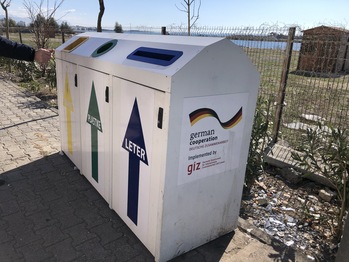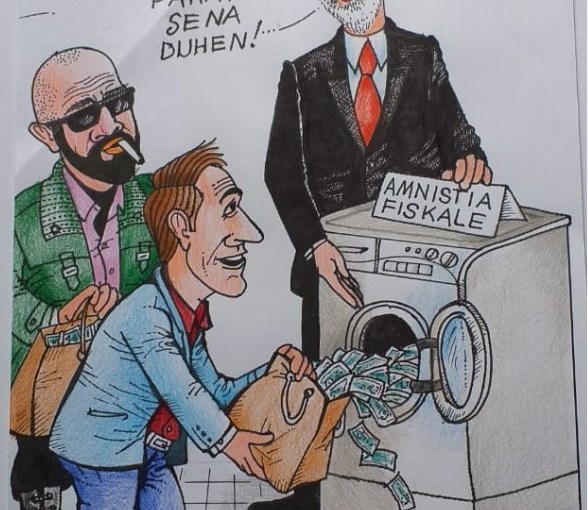Ein unglaublicher Skandal macht sich an der Küste auf, wo wir noch Neue Fotos einstellen, was Edi Rama und die Gangster im Ministerium organisierten, seit 25 Jahren. Unterschrift Edi Rama, Ministerin: Mirela Kumbaro auf der Basis erneut bekannter gefälschter Grundstücks Urkunden, die nur für Gangster vor über 10 Jahren von der Richterin Dhurata Billa ausgestellt wurden, die keinerlei Kompetenz hatte, mit dem in Haft sitzenden Bedri Lukka. Currilla, Durres
Unterschrift, erneut Edi Rama, und Ministerin: Mirela Kumbaro
Erneut Partner der GIZ Mafia, diese Umwelt Terroristen der Albaner Mafia: welche auf Grund von gefälschten Dokumente Grundstücke und Wälder verteilt: Mirela Kumbaro
Albanien modernisiert sein Abfallwirtschaftssystem (abgeschlossen)
Projektkurzbeschreibung
Bezeichnung: Modernisierte, klimafreundliche Abfall- und Recyclingwirtschaft in Albanien
Auftraggeber: Bundesministerium für wirtschaftliche Zusammenarbeit und Entwicklung (BMZ)
Land: Albanien
Politischer Träger: Ministerium für Tourismus und Umwelt
Gesamtlaufzeit: 2020 bis 2023

Ausgangssituation
Albanien wurde 2014 der Status eines Bewerberlandes der Europäischen Union (EU) zuerkannt. Im Rahmen des Integrationsprozesses arbeitet das Land daran, seine Umweltstandards an die der EU anzugleichen. So erreichte Albanien im Jahr 2020 bei der Umsetzung von Kapitel 27 des Besitzstands der EU, das den Titel „Umwelt und Klimawandel“ trägt, einen mittleren Fortschritt von 48 Prozent.
2019 behandelte Albanien etwa eine Million Tonnen Hausmüll. Davon gelangten rund 78 Prozent auf Deponien, wo der Hausmüll mit verschiedenen Verfahren, die sich in Bezug auf die Umweltverträglichkeit voneinander unterscheiden, entsorgt wurde. Etwa 19 Prozent wurden zum Recycling aussortiert. Organische Abfälle, die etwa 50 Prozent des entsorgten Mülls ausmachen, führen zur Entstehung des stark klimaschädigenden Treibhausgases Methan. Deponiegase und Sickerwasser verschmutzen sowohl das Wasser als auch den Boden und gefährden damit die Landwirtschaft und die Trinkwasserversorgung.
Ministry of Tourism and Environment
aus
https://www.giz.de/de/weltweit/62845.html
dieses Fälschungs Dokument, führte ebenso zur Beschlagnahme,
„Der Marinestützpunkt der Armee in Sarande, wird beschlagnahmt“ Ein
Mafia Geschäft von „Kastrati Group“ sh.a. Army naval base under seizure,
VOA: SPAK investigates the privatization of Limion in Saranda Alle
Dokumente gefälscht, gerade rund um die „Kastrati Group“ sh.a. und
Phantasie Firmen.
Army naval base under seizure, VOA: SPAK investigates the privatization of Limion in Saranda
der Fälscher, wieder einmal der damalige Generalstabschef, heute Präsident: wie wikileaks schon berichtete. Vollkommen korrupt, mit Ausnahme der damaligen Marine Leute, deren Navy Akademie in Vlore geschlossen wurde, weil man nicht aktiv bei dem Betrug mitmacht und Alles verweigerte
Admiral: Kudret Cela (Rechts)der letzte korrekte Admiral von Albanien vor Jahren: Kudret Cela und Akademie Leiter
Das Albanische NATO Militär: Fest in Hand von Kriminellen: Mimi Kodheli, Arben Imani, Fatmir Mediu, Petro Koci, Olta Xhacka, Ylber Dogjani
Die Grenzlose, dreiste Frechheit der Edi Rama, Kumbaro und Durres Gruppe geschah zusammen gefälscht 2022, u8nd jetzt lassen die wieder Alte Bäueme umholzen an der KÜSTE
https://www.spiegel.de/wirtschaft/unternehmen/us-investor-stanford-wegen-betrugs-zu-110-jahren-haft-verurteilt-a-838970.htmlKorruptionsvorwürfe gegen Investor - Transparency Deutschland
15.12.2023 ... Laut SWR wirft die US-amerikanische Regierung dem afghanischen Investor Ajmal Rahmani Bestechung, Wettbewerbsbetrug und Steuerhinterziehung ...
https://www.botasot.al/de/projekti-turistik-i-dhendrit-te-trump-per-sazanin-ne-vemendje-te-zerit-te-amerikes/
Das touristische Projekt von Trumps Schwiegersohn für Sazan, im ...
Das Unternehmen wurde von Investoren aus Ländern des Nahen Ostens unterstützt, darunter rund 2 Milliarden US-Dollar vom Public Investment Fund Saudi-Arabiens.
Diese Frau, Fake Studium der Dummheit, verkauft wie Taulant Balla, Innenminister, Fake Studium, direkt an Kriminelle in Durres, Grundstücke, Wälder mit bekannten gefälschten Papieren der längst abgesetzten Richterin: Dhurata Bila und ihren Dumm dreisten Banden, wo die Papiere schon eine falsche Vermessung haben. Unterschrift dann der Langzeit Fälscher Banden auch vom Premierminister Edi Rama. Und wie vor über 20 Jahren schon an Drogen Händler, Kriminelle usw.
Hier war Edi Rama auch schon dabei. die Zone Touristik zu stehlen, Landesweit
Video über die Bau Mafia - Durres und Albanien
Agim Sinojmeri war der Vertrags Partner bei der GTZ Studie der ghh
Alle wichtigen Strände sind verschmutzt, stellt erneut das Gesundheits
Ministerium (Ministria e Mjedisit nxjerr fiktivisht nga lista e zezë 11
plazhet e ndotura në vend )fest und genau das verkauft man in
Deutschland mit der PR Methoden der GTZ, welche nur noch Mafiös operiert
mit dem Lobby Verband DAW, als Tourismus Förderung.
Republic Sazan - das Sazan Projekt der Albanischen US Mafia
was eine Kopie der im Volks Mund auch geannten “Republic Currila” des Projektes der Marian Durres www.albania.de werden sollten.
aus http://karl-kreibich.over-blog.com
Mirela Kumbaro

Mirela Kumbaro Furxhi (* 4. März 1966 in Tirana) ist eine albanische Hochschullehrerin und Politikerin der Sozialistischen Partei Albaniens PSSh (Partia Socialiste e Shqipërisë), die zwischen 2013 und 2019 Kulturministerin war und seit September 2021 Ministerin für Tourismus und Umwelt ist.
Leben
Mirela Kumbaro Furxhi begann nach dem Schulbesuch ein Studium der Fächer Französische Zivilisation und Literatur an der Fakultät für Geschichte und Philologie der Universität Tirana, welches sie 1988 beendete.
Es gibt keine Juristische Erfahrung in Albanien, das sind Alles Idioten wie heute in Durres.
Es gibt keine Juristische Erfahrung in Albanien, das sind Alles Idioten wie heute in Durres.
Festnahme von Durres Kadaster Leitern insgesamt: 5 Personen, darunter den Berisha Gangster: Bedri LUKA , wo nur in Spitale: 448/000 qm Land beschlagnahmt wurde. 9 weitere Juristen, Vermesser wurden ebenso verhaftet
Keine Richterin ist zustaendig, aber die Richterin Dhurata Billa, stellte trotzdem Grundstuecks Urkunden fuer Obst Plantagen aus, wo Hauser gebaut wurden wie vorueber 10 Jahren
Veräußerung von Grundstücken in Durrës, hier ist die Entscheidung des Gerichts für den ehemaligen stellvertretenden Direktor des Katasteramts und vier weitere Personen
GESCHRIEBEN VON SOT.COM.AL
14. April 2024
Veräußerung von Grundstücken in Durrës, hier ist die Entscheidung des Gerichts
Das Gericht in Durrës hat die Sicherheitsmaßnahme der Festnahme des ehemaligen stellvertretenden Direktors von Kataster, Leonard Kadrimi, und vier weiterer Personen, Lirim Xhameta, Dashnor Taulla, Ardit Këtusha und Gjovalin Ndoci, bestätigt, denen die Fälschung von Immobilien in Spitalle vorgeworfen wird. Den fünf Festgenommenen wird die Veräußerung von 448.000 m2 Land in Spitalle vorgeworfen.
Es ist bekannt, dass bisher 23 Personen verhört wurden, darunter zwei ehemalige Leiter des Katasteramts, Liridon Pula und Bedri Luku, die die bei der Registrierung dieses Landgebiets angewandte Praxis aufgezeigt haben. Ebenso wurden eine Reihe von Dokumenten beschlagnahmt, die den Ermittlern helfen sollen, die Rolle der beteiligten Personen herauszufinden.
Der noch fruehre Kadaster Chef, den ich persoenlich sprach, auf die Fakten hinwies, war ab 2005 im Amte. er stahl 1.000 Hektar, im Raum Durres bis man ihn in die sprengte, als er zufaellig sein Altes Merdedes Modell in Vlore benutzte:
Der Vasil Hila Skandal, wo hohe Haftstrafen ausgesprochen wurden, gegen die Kadaster Banden war in 2004.
Geschaffen von den EU Kriminellen, durch die Dezentralisierung
(nur gab es in keiner der 353 Neuen Kommunen, kinen einziges Juristen, noch Fachmann) man verkaufte Albanien an Kriminelle, ohne Bildung
unter Klaus Klipp, einem SPD Dumm Gangster aus Frankfurt, welche den EU Regional Fonds leitete
Bei den Ermittlungen wurde festgestellt, dass von verschiedenen Personen, unter Verwendung gefälschter Dokumente sowie von Mitarbeitern der Landeskatasterbehörde Handlungen vorgenommen wurden, die zur Veräußerung von 448.000 m2 Land vom Staatseigentum in Privateigentum führten . . Unterdessen werden der ehemalige stellvertretende Leiter des Katasteramts, Leonard Kadrimi, und der ehemalige Anwalt Ardit Kërtusha verdächtigt, ihre Pflichten missbraucht und die Veräußerung von Immobilien erleichtert zu haben.
Alienation of properties in Durrës, here is the court's decision for the former deputy director of Cadastre and 4 other people

The Durrës court has upheld the security measure of arresting the former deputy director of Cadastre, Leonard Kadrimi and 4 other people, Lirim Xhameta, Dashnor Taulla, Ardit Këtusha and Gjovalin Ndoci, who are accused of forging properties in Spitalle. The 5 arrested are accused of alienating 448 thousand m2 of land in Spitalle.
It is learned that so far 23 people have been interrogated, including two former heads of the Cadastre, Liridon Pula and Bedri Luku, who have shown the practice followed for the registration of this land area. Similarly, a number of documents have been seized that are expected to help the investigators to discover the role of the persons involved.
From the investigations, it has been found that actions were carried out by various persons, by means of forged documents as well as employees of the State Cadastre Agency, which led to the alienation of 448,000 m2 of land from state-owned property to private property. . Meanwhile, the former deputy head of the Cadastre, Leonard Kadrimi, and former lawyer Ardit Kërtusha are suspected of abusing their duties and facilitating the alienation of real estate.
Die Grundstücksverbrecher Banden, des Helidon Gjikoka,in Vlore, Dhermit mit Ardian Mustës
Korrupte Mafia Frauen in Tirana: Romana Vlahutin, Amar Laptos, Monika Kryemadhi, Genoveva Ruiz Calavera, Agnes Bernhard
Eine Profi Betrügerin mit gefälschten Prof. Titel u.a. den sogar die New York Times schrieb darüber, das Uni in New York, niemals eine Lizenz für die Mafia Uni in Tirana gab. beigefügen Lebenslauf und in den folgenden Links:
Andere berühmte gefälschte Diplome, von Mafia Unis u.a. für Renzi Bossi, der nie in Albanien war und sogar bei einer Fakultät studierte, die es ebenso nie gab. Ein Anti-Mafia Fall, in Italien ** In Albania, Can a U.S. Diploma Deliver? – The NewYork Times
Deutsche Betrugs Experten, wo sogar schriftlich die Weltbank Report das erwaehnen und KfW Partner rund um Berlinwasser

Anduena Stephan, als Betrügerische Wasser Expertin unterwegs, obwohl keine Ausbildung vorlag

Ksmali, Inseln, Sarande identisch, die Deutsche Aufbau Mafia bezahlte i Betrugs Projekten: Infrastruktur
wo einmal Waelder waren und ab 2006 das Weltbank Programm: Coastal Managment Plan, wo ueber 200 illegale Bauten abgerissen wurden. Identisc Dhermi
[gallery ids="345,13455,2686"]
.
Albanian organised crime has reached the United States,
creating partnerships with the Gambino, Genovese, and Luchese
families to facilitate specific crimes.
http://www.setimes.com/html2/english/031121-DIMITRIS-001.htm
Dieses Projekt erhielt niur ein befristete Projekt Genehmigung und als
Ilir Meta zurück treten mußte, war das Projekt erledigt, weil die
Hintermänner weder die Geologischen Gutachten, noch eine Vermessung,
oder richtige Baupläne vorlegen konnten. Das Projekt erhielt keine Bau
Genehmigung, weil es Vetos von höherer Seite gabe und die NATO dieses
Projekt verhinderte, denn auf Grund von Verträgen unterliegt die Küste
der Albanischen Marine in enger Zusammenarbeit mit der NAZO (Italiiener)
und Häfen benötigen deshalb einer weiteren Zustimming um Schmuggel
etc.. zu vverhindern.
Dem Ehemann, einem uralt Gangster, hat man auch die Grundstücke mit gefälschten Urkunden beschlagnahmt. Diese Frau, da war die Mutter schon eine der übelsten Kinderhändlerinnen vor 20 Jahren und Edi Rama Financier, wie der Drogen Boss:
After the government awarded a 30-year lease for a beach on the lucrative southern coast in March 2022, it turned out that the beneficiary company was owned by the husband of Xhacka, then Foreign Minister.
The opposition asked to have Xhacka’s mandate as MP declared null and void, since the constitution bans parliamentarians from obtaining publicly owned properties for themselves or their family members. Xhacka denies this is the case.
Albania’s Parliament Blocks Court Review of Former Minister’s Immunity
Auf Anfrage bei der GTZ, was diese
Unfugs Studie sollt, wo eine Consult beauftragt wurde, welche keinerlei
Kenntnisse über Tourismus hatte, schweigt sich die GTZ aus. Eine
typische Alibi Studie, wo ein anderer Zweck verfolgt wurde
Und wenn man dort nach dem damaligen Partner Agim Sinojmeri frägt, hört
man gar Nichts mehr von der GTZ. Zur aktiven Unterstützung gehörte
damals der Verkauf der Visas durch die Deutsche Botschaft und mit Hilfe
kriminelle agierender Deutscher und Firmen in Albanein. Man war damals
schon schwer beschäftig, die gesamte Albanische Mafia mit Visas
auszustatten, denn das ist ein lukratives Geschäft und für Investoren
hatte man keine Zeit, genauso wenig wie 2007.
Good business in
der Deutschen Botschaft eben und mit vile Aufwand, wurden über 3.000
Geschäfts Visas nachträglich für ungültig erklärt, was einen Gewinn von 3
Millionen € ausmacht. So kann man natürlich auch solche Investments
finanzieren.
Kein Deutscher wurde bis heute wegen der Visa Garantie angeklagt
und haftbar gemacht, obwohl sich absolut Alle daran in Tirana
beteilgiten und von den DAW und GTZ Leuten hiilfreich unterstützt
wurden.
Agjëll Agaçi: Drogen Bosse, im Kabinett des Edi Rama, als System
die Migrations Zentren dienen nur als Schule, fuer Drogen-, Frauen-, Kinder Handel in Euroa Edi Rama, zuvor, Berish. Fatos Nano; Grundstuecke an der Kueste, werden ohne Gesetz, Umweltschutz an Kriminelle verkauft die ihr Geld waschen wollen was ueber 25 Jahre bekannt ist, , es frueh Super Skandale gab auch rund um Vasil Hila, Sokol Kociu … Agjëll Agaçi: Drogen Bosse, im Kabinett des Edi Rama, als System weiterlesen
und nochmal in der Currilla, der Drogen Rapper, wie Bes Kallaco. Musik dient der TaTarnung des Drogen Vertriebes was uralt bekannt. Er hat in der Nähe, noch einen Pleite Club illegal gebaut und gekauft, der Tirana Mafia. Hier wurden 50 Alte Bäume an der Küste, bereits im Oktober, November 2023 um geschlagen, kein Gesetz eingehalten.
Festnahme des Arif Kajtazi Clans und „Albanien ist das Paradebeispiel für ein Chaos-Land in Gangsterhand“
Das Ilir Meta, Drogen Kartell beherrscht praktisch Alles auch in Deutschland. Der Visa Skandal lässt grüßen aus 2004
Als das Foto vor über 10 Jahren entstand, war der Drogen Schmuggel, Geldwäsche von Bes Chollaku, wie bei Anderes gut bekannt. Durch Schein Scheidung, versucht man die Lokale, Firmen, Villen frei zu bekommen, denn die SPAK Staatsanwaltschaft in für solche Beschlagnahmen bekannt. Schenkte schon vor über 10 Jahren, durch den Freien Drogen Handel in Deutschland, seiner Mutter Luxus Autos

Bes Collaku und Angela Merkel
10 Millionen Euro Vermögen/ Wie Besi und Xhensila mit der falschen Trennung, der Verbindung zu Kokainhändlern und Ilir Meta versuchen, der SPAK zu entkommen
Shkruar nga Pamfleti
10 Millionen Euro Vermögen/ Wie Besi und Xhensila versuchen, der SPAK zu entkommen





